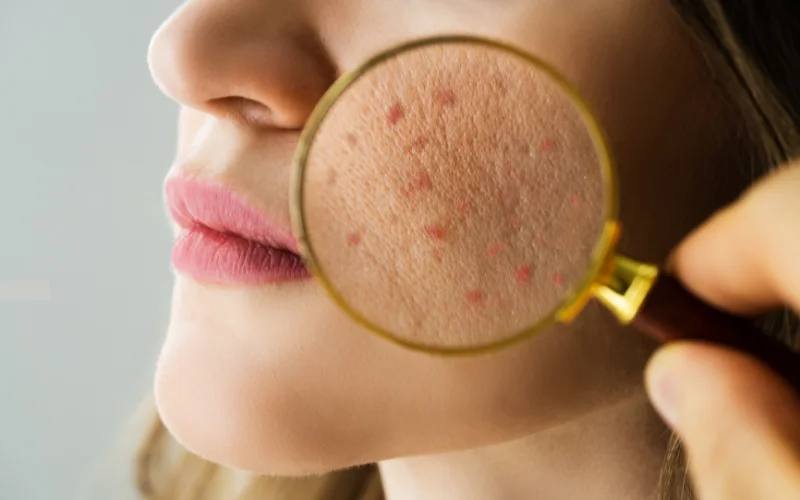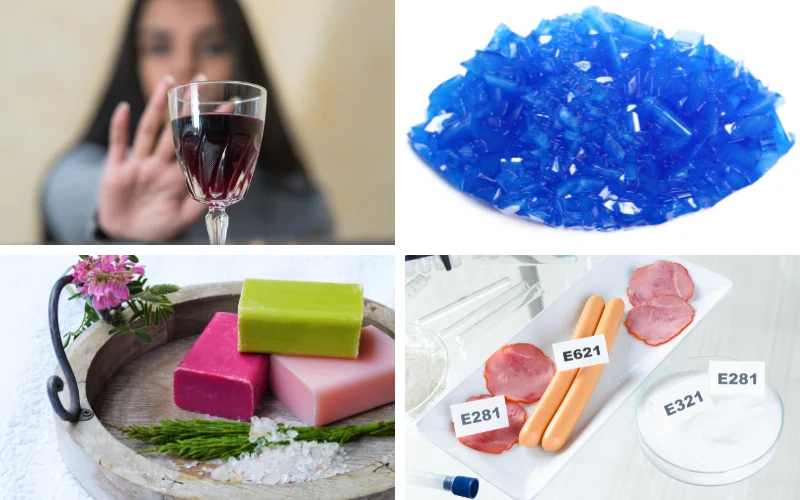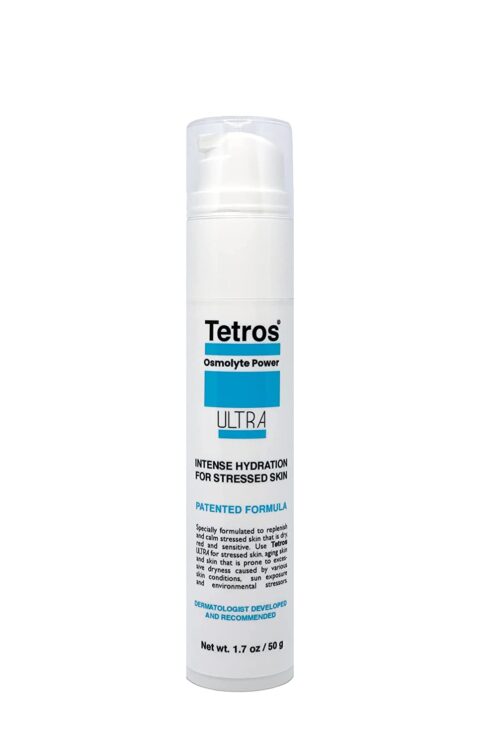Sensitive skin is a common issue that affects many people. You are most likely to fall into this category if you have redness or easily irritated skin. People with conditions like rosacea, eczema, and psoriasis are also prone to sensitive skin.
While managing sensitive skin can be frustrating, it doesn’t have to make your life difficult. You can effectively balance and soothe your skin by choosing the right products and skincare routine. First, it’s important to understand that sensitive skin requires extra care and attention.
When selecting the products for your skin, you should avoid harsh chemicals and irritating ingredients. Opt for Tetros® ULTRA, which is gentle, fragrance-free, and specifically formulated to benefit the skin’s deep tissues.
Symptoms Of Sensitive Skin
You likely have sensitive skin if you are experiencing common symptoms such as:
– Frequent reactions to skin care products and food ingredients
– Frequent and persistent redness
– Itching
– Stinging or burning on your skin
– Dry skin
– Forehead wrinkles or under-eye wrinkles
Why Does My Skin Become Sensitive?
Our skin consists of many different layers. The thin layer on the surface is called the stratum corneum, which plays a vital role in protecting the skin from external stress factors such as infections, allergens, irritants, and sunlight.
Skin sensitivity is a matter of personal perception, making it difficult to identify a precise cause. Sensitivity is perceived when nerve endings in the upper layers of the skin react to stimuli like sun exposure, touch, warmth, cold, and trauma, each of which may cause pain, itch, dryness, and irritation. These symptoms arise when the skin’s natural protective barrier is weakened or broken down by various stress factors, both internal and external.
Soaps, detergents, cleansers, fragrances, and harsh chemicals such as alcohol and bleach can cause skin sensitivity. It may also be a symptom of the flare-up of an underlying condition like allergic dermatitis, eczema, psoriasis, or rosacea.
Morning Routine For Sensitive Skin
Starting your day with a gentle morning routine is crucial for maintaining a healthy and radiant complexion. Taking the time to care for your skin with tenderness ensures that it stays calm and resilient against daily stressors. So, it’s important to be kind to your skin and provide it with the care it deserves.
Gentle Cleansing
When you wake up in the morning, start your day by washing your face with a gentle and non-irritating cleanser. It should remove any dirt or oil that may have accumulated overnight without taking away the natural oils of your skin. Choose a cleanser that is mostly water-based and contains moisturizing ingredients, as it will help hydrate your skin.
Calming Toner
Apply a calming toner with a cotton pad to gently remove any remaining impurities. Choose an alcohol-free toner that has ingredients such as chamomile or rose water. These ingredients can soothe the skin and help to reduce inflammation.
Optimal Moisturization
Choosing the right moisturizer can make a big difference in nourishing and safeguarding your skin. To keep your skin healthy, use a gentle, hypoallergenic moisturizer. Hypoallergenic moisturizers help strengthen your skin’s barrier and should contain ceramide, cholesterol, and fatty acid, which help hydrate and protect your skin. Tetros® ULTRA cream has been specially developed to protect sensitive and stressed skin.
Sun Protection
To combat harmful UV rays, use a broad-spectrum sunscreen, with at least SPF 30. This will reduce sensitivity to sunlight and help prevent wrinkles and fine lines, especially on the face and the delicate under eye area. Choose a mineral-based formula that is less likely to cause breakouts or irritation.
Lip Care
Apply a soothing and hydrating lip balm throughout the day to keep your lips moisturized and free from cracks and inflammation.
Evening Routine For Sensitive Skin
As night falls, it’s time to switch to your evening skincare routine. This routine focuses on helping your sensitive skin rejuvenate and heal while providing it with much-needed hydration. By following a night skincare routine, you can give your skin the restorative care it needs to face the next day with confidence.
Remove Makeup
If you wear makeup, use a gentle, hypoallergenic makeup remover. that can dissolve makeup without harsh rubbing.
Second Cleanse
Repeat your gentle cleansing routine i.e. wash your face with a gentle and non-irritating cleanser to ensure all makeup and impurities are removed, leaving your skin fresh and ready for night time skin care products.
Night Treatment
Apply your nighttime treatment products as recommended by your physician. This may, in particular include the use of products that contain a gentle retinoid and/or peptide to help with repair and recovery from damage.
Soothing Mask
Incorporate a gentle, hydrating mask into your routine once or twice a week. This step can help address dryness and provide extra moisture and calming benefits to your skin.
Optimal Moisturization
Choosing the right moisturizer can make a big difference in nourishing and safeguarding your skin. To keep your skin healthy, use a gentle, hypoallergenic moisturizer to help replenish your skin’s barrier. The ideal moisturizer should contain at least ceramide, cholesterol, and fatty acid, which combine to hydrate and protect your skin. Tetros® ULTRA cream has been specially developed to protect sensitive and stressed skin.
Tips For Strengthening Sensitive Skin
- Use broad spectrum sunscreens in winter and summer, even when indoors, to shield your skin from harmful rays.
- Increase water intake to keep your skin hydrated and detoxified from within.
- Everything we eat affects our skin. Avoid excessively oily and packaged products, and try to eliminate the foods that you think your skin reacts to.
- Always keep your skin moisturized.
- Mental stress can negatively affect both skin and digestion. Engage in activities like meditation, yoga, or sports to improve blood circulation and promote skin healing.
Ingredients To Avoid
If you have sensitive skin, some ingredients may cause a bad reaction. To avoid this, it’s best to steer clear of products that contain:
- Alcohol and other harsh chemicals such as industrial cleansers
- Soaps and detergents
- Fragrances
- Certain preservatives
- Sulfates
It is recommended to conduct a patch test when trying out a new skincare product. This involves applying a small amount of the product to a small area of skin, such as behind the ear or on the inner forearm, and waiting for at least 24-48 hours to see if any adverse reactions occur. This can help identify any potential allergies or sensitivities to the product before it is applied to a larger skin area, such as the face.
Conclusion
Managing sensitive skin requires patience and mindfulness, but achieving a healthy, glowing complexion with the right care is possible. By understanding your skin’s unique needs and tailoring your skincare routine accordingly, you can minimize irritation and protect your delicate skin barrier. Remember, the goal is to support your skin’s health gently and effectively, ensuring long-term well-being and comfort.
Frequently Asked Questions
How Do I Know If A Product Is Suitable For Sensitive Skin?
Look for products labeled as “for sensitive skin,” “hypoallergenic,” or “fragrance-free.” And contain Ingredients that are known to be beneficial for stressed and sensitive skin.
Can Sensitive Skin Become Less Sensitive Over Time?
Yes, with the right skincare routine and avoiding irritants, your skin’s tolerance can improve over time.
Is Makeup Safe For Sensitive Skin?
Yes, but choose mineral makeup or products formulated for sensitive skin, and always remove makeup gently at the end of the day.













Leave A Comment